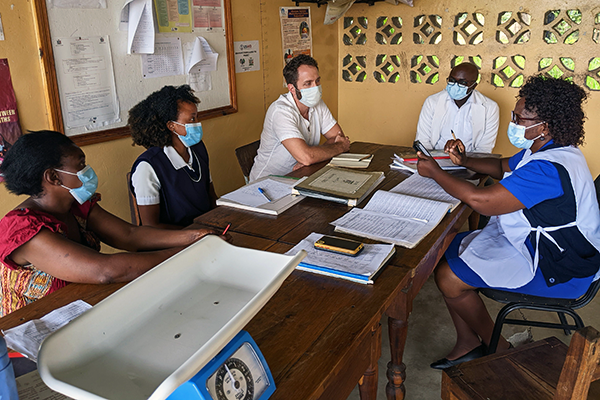Helping Pregnant Women Protect Themselves from Malaria in Zambia
June 24, 2022

From left to right: Trence Mundawarara, community volunteer; Theresa Ndhlovu, nurse; Jordan Smith, monitoring, evaluation, and learning advisor at MCD; Dr. Kabila Collins, provincial OTSS supervisor; and Mable Chewe, nurse and midwife in blue, at St. Mary’s Hospital in Lufwanyama, Zambia. Photo courtesy of IM Zambia.
It is a sunny day at St. Mary’s Hospital, a rural hospital in Zambia’s Copperbelt Province. Mable Chewe is spending her day with a small group of St. Mary’s staff working her way through a checklist designed to help health workers provide the highest standard of quality care to pregnant women. While the checklist is clear and helpful, Mable knows that a friendly, warm approach can make all the difference when working with pregnant women to protect them from malaria.
Mable was born and raised in Zambia where she grew up helping care for younger children. This set the stage for her future role in helping others, especially women and children.
“The zeal to help the sick mother and child helped me decide what to do later in my life. When I look at a pregnant woman and think of the life of the unborn child, and when I think about the effects of malaria on pregnancy, mother, and fetus, I am deeply moved to do the best I can to help pregnant women protect themselves from malaria.”
As part of the U.S. President’s Malaria Initiative (PMI) project, Mable participated in training in 2018 on the outreach training and supportive supervision (OTSS) approach, provided by MCD Global Health (MCD), a U.S.-based nonprofit and U.S. PMI partner of more than 15 years, as a way to improve quality of malaria diagnosis, and later, quality of care. OTSS assessments are conducted by trained laboratory, clinical, and midwifery supervisors on a regular basis and measure changes in health facility staff performance over time.

Reflecting on how she felt before participating in the training, she shared that she “felt inadequate, had limited knowledge, and lacked confidence” but now feels “enlightened.”
“OTSS helps me facilitate onsite training and orientation of nurses and midwives in prevention and treatment of malaria in pregnancy and helps me focus on ensuring that all guidelines, job aids, and strategy documents pertaining to malaria in pregnancy and antenatal care at the health center level are adhered to,” she shared. “Ultimately, OTSS helps me improve provider performance through quality support supervision at the facility level.”
Zambia carries 2% of the global malaria case burden and 5.2% of the case burden in east and southern Africa. Malaria is the number one cause of hospitalization in Zambia and a major cause of morbidity and mortality, particularly in pregnant women and young children. Recent surges of malaria in sub-Saharan Africa — due to changing landscapes, wetter and warmer seasons, and COVID-19 disruptions — have made Mable’s role more important than ever.
The approach originated from the U.S. PMI Improving Malaria Diagnostics project by the Zambia National Malaria Control Centre, in partnership with MCD. The structure of OTSS allows supervisors to provide ongoing support to staff through regular mentoring and on-the-job training. Staff then receive feedback with action points agreed upon for the next visit.
“I was very excited that I had acquired the knowledge and skill I needed most to personally contribute to the elimination of malaria,” she said. “The training has helped me to, most importantly, provide technical leadership and guidance to the malaria clinical and nursing staff in the implementation and monitoring of malaria in pregnancy program.”
Mable uses the OTSS approach to observe other nurse midwives as they offer advice and resources on preventing malaria in pregnancy, screen pregnant women for malaria symptoms, and perform malaria rapid tests.
To prevent complications as a result of severe malaria in pregnancy, Mable’s nurse midwives encourage pregnant women to sleep under an insecticide-treated bed net, take preventive medication, and seek prompt diagnosis and treatment if any malaria symptoms should arise.
“Malaria infection in pregnancy is a major threat to pregnant women and the health of their babies,” she said. Pregnant women are particularly vulnerable to malaria when they become infected because pregnancy reduces a woman’s immunity, increasing the risk of illness, severe anemia, and death. Maternal anemia increases the risk of miscarriage, still birth, premature delivery, and low-birth weight.
Mable knows many of the pregnant women she works with can be nervous, especially if they are new and don’t know what to expect. She has learned that making patients feel comfortable is part of a holistic approach in providing high-quality care. Her warm, friendly style helps make the antenatal clinics inviting, which is key to her success.
“I get to know patients individually, learning where they work, their hobbies, and what other challenges they have at home,” she said. “Their first impression will come from the waiting area, so we make sure it is clean. I strive to make patients feel valued and special as they are much more likely to come back.”
In addition, ensuring that patients are informed is an important aspect of her role. This includes displaying information, education, and communication materials translated in the local language from the “very first visit throughout the course of the pregnancy.”
Despite recent increases in malaria cases, Mable remains optimistic. “We have many reasons to be hopeful: Communities and partners are more engaged in the elimination of malaria with strong political commitment and getting everyone on board from the community to higher levels of care.
“A future without malaria sounds ambitious, but of course, why not be optimistic? If we continue our campaign and work, then it is absolutely possible we could eliminate malaria.”